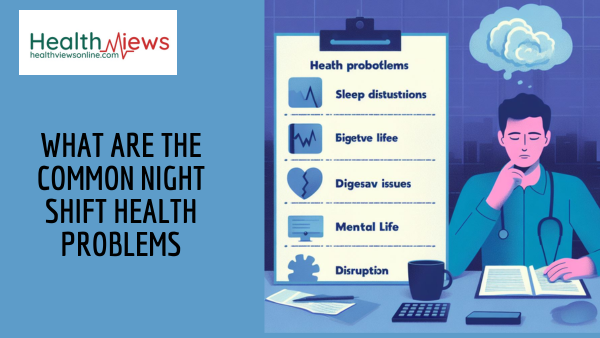Night shift work has been extensively studied since it jeopardizes various elements of human health, including homeostasis and well-being. The night shift is a vital part of many enterprises’ normal work. Businesses work through the night to create as much volume as feasible to meet market needs. Individuals are biologically affected by night shift jobs. The inversion or disruption of the sleep-wake cycle is a source of stress for the endogenous regulation of biological functions’ circadian rhythms. Employees suffer from various common night shift health problems and work these irregular shifts for extended periods of time.
What are these problems? And what can be done to prevent them from happening in the first place? Here you will get the health problems with their symptoms, prevention, and how to combat them in this article.
Also, Read Narcolepsy: Symptoms, Causes, Prevention, and Treatment
Top 10 Common Night Shift Health Problems with Symptoms, Prevention and Care Tips
1. Sleep Disorders
Symptoms: Insomnia, excessive daytime sleepiness, difficulty concentrating.
Prevention: Maintain a consistent sleep pattern, establish a sleep-friendly environment, and avoid coffee and gadgets before bedtime.
Care tips: Consult a healthcare expert for an assessment and treatment alternatives, such as cognitive behavioral therapy for insomnia (CBT-I).
2. Digestive Issues
Symptoms: Indigestion, constipation, abdominal discomfort.
Prevention: Maintain a healthy diet, avoid big meals before bedtime, and stay hydrated.
Care tips: Consult a healthcare practitioner for nutritional advice, and consider including fiber-rich foods in your diet.
Also, watch health views web stories: 8 Tip to Improve Sleep Quality Naturally
3. Weight Gain and Obesity
Symptoms: Increase in body weight, elevated BMI.
Prevention: Eat nutritious meals at regular intervals, exercise regularly, and limit your intake of sugary or high-calorie foods.
Care tips: Regularly monitor your blood pressure and get advice from a healthcare practitioner on how to manage your cardiovascular health.
4. Cardiovascular Issues
Symptoms: High blood pressure, and increased risk of heart disease.
Prevention: Regular cardiovascular exercise, balanced diet, and stress management techniques.
Care tips: Monitor blood pressure regularly and consult a healthcare professional for guidance on managing cardiovascular health.
5. Mental Health Disorders (e.g., Depression, Anxiety)
Symptoms: Persistent sadness, feelings of anxiety, changes in appetite or sleep patterns.
Prevention: Seek social support, practice relaxation techniques, and think about counseling or therapy.
Care tips: Consult a mental health professional for an evaluation and treatment options, which may include counseling, medication, or dietary changes.
6. Metabolic Syndrome
Symptoms: High blood sugar, elevated cholesterol levels, high blood pressure, abdominal obesity.
Prevention: Maintain a healthy diet, engage in regular physical activity, and manage stress.
Care tips: Consult a healthcare professional for assistance in monitoring and controlling metabolic health.
7. Impaired Cognitive Function
Symptoms: Difficulty with memory, concentration, and problem-solving.
Prevention: Engage in mental stimulation activities, get regular exercise, and ensure adequate sleep.
Care tips: Practise cognitive exercises and seek a professional evaluation if symptoms persist.
8. Weakened Immune System
Symptoms: Frequent illness or infections.
Prevention: Eat a well-balanced diet, exercise regularly, and practice basic cleanliness.
Care tips: Consult a healthcare practitioner for immune system boosting suggestions.
Also, watch health views web stories: 10 Foods to Boost Haemoglobin
9. Social and Relationship Issues
Symptoms: Difficulty in maintaining relationships, and social isolation.
Prevention: Prioritise social ties, talk openly with loved ones, and seek help when necessary.
Care tips: Think about seeking guidance from a counselor or therapist if you are experiencing relationship difficulties.
10. Increased Risk of Accidents
Symptoms: Increased likelihood of accidents or errors due to impaired alertness.
Prevention: Take regular breaks, obtain enough sleep during the day, and practice proper workplace safety procedures.
Care tips: Report any events as soon as possible and get medical help if necessary.
In conclusion, working night hours can cause various common night-shift health problems that can damage physical, mental, and emotional well-being. Sleep disorders, digestion problems, weight gain, cardiovascular concerns, mental health disorders, metabolic syndrome, reduced cognitive function, weaker immune system, social and relationship obstacles, and an increased risk of accidents are among these issues.
Prevention actions such as having a regular sleep pattern, eating a well-balanced diet, exercising regularly, and seeking social support can all assist in reducing these health risks. Furthermore, getting prompt assistance from healthcare specialists is critical for managing and addressing specific health problems related to night shift work.
Remember that everyone’s health demands are different, so it’s best to consult with a healthcare expert for personalized advice and specific methods. It is feasible to achieve greater health and well-being when working night shifts with good self-care and proactive actions.
Also, Read the Complete Guide on Lack of Sleep: 10 Side Effects!





